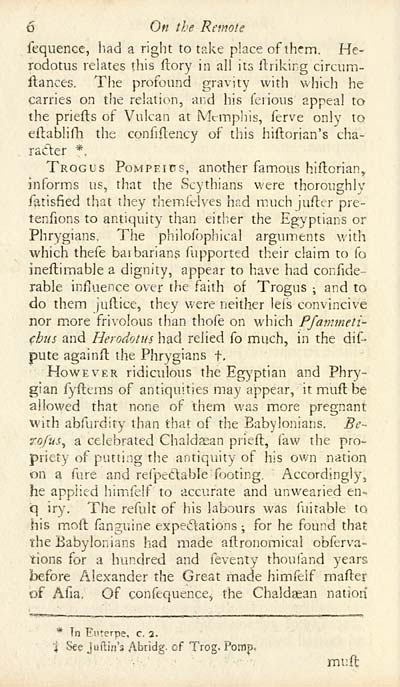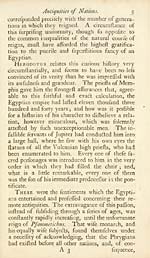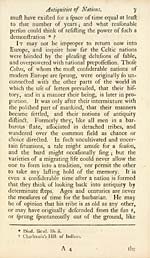Blair Collection > Critical dissertations on the origin, antiquities, language, government, manners, and religion, of the antient Caledonians, their posterity the Picts, and the British and Irish Scots
(44)
Download files
Complete book:
Individual page:
Thumbnail gallery: Grid view | List view

6 On the Remote
fequence, had a right to take place of them. He-
rodotus relates this ftory in all its ftriking circum-
flances. The profound gravity with which he
carries on the relation, and his ferious appeal to
the priefts of Vulcan at Memphis, ferve only to
eilablifh the confiflency of this hiflorian's cha-
rade r *.
Trogus PoMPEirrs, another famous hiftcrian,
informs us, that the Scythians were thoroughlv
/atisfied that they themfclves had much juftcr pre-
tenfions to antiquity than either the Egyptians or
Phrygians. The philofophical arguments with
which thefe baibarians fupported their claim to fo
ineflirnable a dignity, appear to have had confide-
rable influence over the faith of Trogus ; and to
do them jullice, they were neither leis convincive
nor more frivolous than thofe on which Pfammeti-
chus and Herodotus had relied fo much, in the dif-
pute againft the Phrygians f.
However ridiculous the Egyptian and Phry-
gian fyflems of antiquities may appear, it muft be
allowed that none of them was more pregnant
with abfurdity than that of the Babylonians. Be-
Tofus^ a celebrated Chaldaean prieft, faw the pro-
priety of putting the antiquity of his own nation
on a fure and refpedable footing. Accordingly,
he applied himifelf to accurate and unwearied en-
<\ iry. The refult of his labours was fuitable to
his mod fanguine expeftations ; for he found that
the Babylonians had made ailronomical obferva-
tions for a hundred and feventy thoufand years
before Alexander the Great made himfelf mafter
of Afia, Of confequence, the Chaldgean nation
* Tn Fnterpe, c. 2.
i See Juftin's Abridg. cf Trog. Pomp.
mi: ft
fequence, had a right to take place of them. He-
rodotus relates this ftory in all its ftriking circum-
flances. The profound gravity with which he
carries on the relation, and his ferious appeal to
the priefts of Vulcan at Memphis, ferve only to
eilablifh the confiflency of this hiflorian's cha-
rade r *.
Trogus PoMPEirrs, another famous hiftcrian,
informs us, that the Scythians were thoroughlv
/atisfied that they themfclves had much juftcr pre-
tenfions to antiquity than either the Egyptians or
Phrygians. The philofophical arguments with
which thefe baibarians fupported their claim to fo
ineflirnable a dignity, appear to have had confide-
rable influence over the faith of Trogus ; and to
do them jullice, they were neither leis convincive
nor more frivolous than thofe on which Pfammeti-
chus and Herodotus had relied fo much, in the dif-
pute againft the Phrygians f.
However ridiculous the Egyptian and Phry-
gian fyflems of antiquities may appear, it muft be
allowed that none of them was more pregnant
with abfurdity than that of the Babylonians. Be-
Tofus^ a celebrated Chaldaean prieft, faw the pro-
priety of putting the antiquity of his own nation
on a fure and refpedable footing. Accordingly,
he applied himifelf to accurate and unwearied en-
<\ iry. The refult of his labours was fuitable to
his mod fanguine expeftations ; for he found that
the Babylonians had made ailronomical obferva-
tions for a hundred and feventy thoufand years
before Alexander the Great made himfelf mafter
of Afia, Of confequence, the Chaldgean nation
* Tn Fnterpe, c. 2.
i See Juftin's Abridg. cf Trog. Pomp.
mi: ft
Set display mode to: Large image | Transcription
Images and transcriptions on this page, including medium image downloads, may be used under the Creative Commons Attribution 4.0 International Licence unless otherwise stated. ![]()
| Permanent URL | https://digital.nls.uk/76287095 |
|---|
| Description | A selection of books from a collection of more than 500 titles, mostly on religious and literary topics. Also includes some material dealing with other Celtic languages and societies. Collection created towards the end of the 19th century by Lady Evelyn Stewart Murray. |
|---|
| Description | Selected items from five 'Special and Named Printed Collections'. Includes books in Gaelic and other Celtic languages, works about the Gaels, their languages, literature, culture and history. |
|---|

